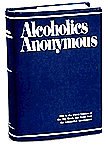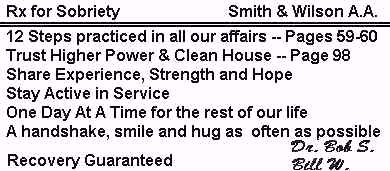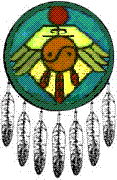

 Click The Images To Go To Page Indicated In The Flag "If you were to ask me what is the greatest danger facing A.A. today, I would have to answer: the growing rigidity -- the increasing demand for absolute answers to nit-picking questions; pressure for G.S.O. to 'enforce' our Traditions; screening alcoholics at closed meetings; prohibiting non-Conference-approved literature, i.e., 'banning books'; laying more and more rules on groups and members." The spirit of real old time AA is being destroyed as more and more people are beginning to ignore one of Bill Wilson's favorite sayings: "Every group has the right to be wrong." What Conference Approved Literature Means I receive questions about this all the time; and people at conferences, Central Offices, and meetings are confronted with the "conference approved" nonsense with great frequency. Any AA can read anything any time anywhere for any purpose. There is no Tradition that says otherwise. There is no Tradition that can or should or will censor or "censure" what is presented at a meeting. And if someone thinks they've found the mythical tradition, tell them the Traditions are not laws, are not binding on anyone, and were never intended to prohibit free speech or freedom of religion or spiritual path by AAs or others. Those who suggest otherwise just don't know A.A. Nor do they know that early Alcoholics Anonymous studied the King James Version of the Bible, read all kinds of literature -- Protestant, Roman Catholic, New Thought, medical, and otherwise, and put out reams and reams of pamphlets and guides as the years went by. Included were pamphlets from many Central Offices and Intergroups -- including the long-running Cleveland Central Bulletin, the Akron AA pamphlets, The Four Absolutes. Then there were other writers mentioned below and not mentioned below – Dr. Silkworth, Clarence Snyder, Sister Ignatia, Marty Mann, Father Pfau, Richmond Walker, Ed Webster, and on-and-on. Not to forget over 500 Oxford Group and Sam Shoemaker books and pamphlets that were read and circulated by Dr. Bob himself. And let's not forget that the most ignored and suppressed writing of all by the "Mother of A.A." - Anne Smith's Journal - contained the heart of early A.A. and was discussed almost every morning during the Smith home Quiet Times. From GSO Box 4-5-9 (Volume 23, No 4) You hear it in meetings, "We have AA Approved Literature available for sale at cost." You hear it in group conscience meetings "We should only allow readings from AA Approved Literature" You hear non-group members cross-talking in a meeting when someone reads from Richmond Walkers' 24 Hours a Day, Emmet Fox's Sermon On The Mount, or one of Ralph Pfau's Golden Books -- "You can't read that in an AA meeting, it's NOT AA Approved Literature." Factually, there is no such thing as AA "Approved" Literature. The early AA's read from the Bible, the Upper Room, Oswald Chambers, Cecil Rose, Leslie Weatherhead, Sam Shoemaker, Emmet Fox, Richmond Walker, Ralph Pfau and many others. A simple check of AA history will bear this out. Whatever some may think, A.A. has no index of forbidden books, and never will have. In the 1950's AA World Services took over WORKS PUBLISHING's rights to publish the Big Book and began publishing other books as well. In the course of the next 40 years AAWS began to publish more books but eventually lost the copyright on the first two editions of the Big Book. Until 1993 books which were owned, copyrighted and printed by AAWS were identified by the use of a Circle-Triangle Symbol bearing the three legacies. On May 21, 1993, due to ill-advised potential lawsuits relative to the Circle-Triangle logo, an AA World Service Ad Hoc committee released an unsigned document titled "Follow-up Statement Regarding Use of the Circle-Triangle Symbol." In it, AAWS stated that "Alcoholics Anonymous will phase out the 'official' use of the circle and triangle symbol in and on its literature, letterheads and other material." That document was issued without a conference action or a "group conscience." [See The Truth of what happened to The Triangle In The Circle] The term "Conference Approved literature" now replaces the 'Circle-Triangle Logo" to merely IDENTIFY (AAGV Vol. 50-7 1993) the books solely owned, copyrighted and published by AAWS and not as a predetermined list. The most definitive illustration of this is that the public domain first edition of the Big Book is NOT Conference Approved. The statement Conference Approved in no way constitutes a list of any written documents of which an AA body approves or disapproves. (Please see the ad hoc committee Final Report of the 1993 General Service Conference) A formal statement concerning the Conference, the G.S.O, and what AA members read was issued by the General Services Office of AA in 1978. It does NOT mean the Conference disapproves of any other publications. Many local A.A. central offices publish their own meeting lists and pamphlets. A.A. as a whole does not oppose these, any more than A.A. disapproves of the Bible or any other publications from any source that A.A.'s find useful. What any A.A. member or group reads is no business of G.S.O., or of the Conference Conference-approved literature "The term 'Conference-approved' describes written or audio-visual material approved by the Conference for publication by General Service Office of Alcoholics Anonymous. This process assures that everything in such literature is in accord with AA principles. Conference-approved material always deals with the recovery program of Alcoholics Anonymous or with information about the AA Fellowship." "The term has no relation to material not published by GSO. It does not imply Conference disapproval of other material about AA. A great deal of literature helpful to alcoholics is published by others, and AA does not try to tell any individual member or group what he or she or they may or may not read." "Conference approval assures us that a piece of literature represents solid AA experience. Any Conference-approved booklet or pamphlet goes through a lengthy and painstaking process, during which a variety of AAs from all over the United States and Canada read and express opinions at every stage of production." (The above statement is taken from service material released by the GSO in New York. From 1951 on, the Trustees Literature Committee, the Conference Literature Committee, and the participants in the General Service Conferences have overseen the content of AA literature which is published by the AA General Service Office.) The Delegates whom the Areas elect and send to New York to the General Service Conference are of varying degrees of wisdom and experience. Some Delegates have had years in the program and some have not much time at all. A few of the Delegates have a detailed knowledge of early A.A. history and the way good old-time A.A. actually worked, but the overwhelming majority do not. All have their own individual points of view. Their decisions as a group usually reflect a good deal of common sense when dealing with disputed issues, when Group Conscience is governed by the Twelve Steps, the Twelve Traditions and the Twelve Concepts of Service. But none of the Delegates whom we elect are divinely inspired, and all of them are ordinary human beings who also have the capability of making disastrously wrong choices. They are no better and no worse than the people who are elected to the U.S. Congress or the British Parliament (neither of which bodies has ever been thought of as a source of divinely inspired and hence universally infallible Truth with a capital T). You should actually attend one of your Area Assemblies and listen to the debates to see what I mean. Drunks who try to get sober by mechanically following all conference pronouncements to the letter will find that there is no magical rule book anywhere which will allow people to heal their spiritual problems by blindly obeying hundreds and thousands of rules. People who try that are seeking the "easier, softer way" that never works, and refusing to take full adult responsibility for their own behavior and its consequences. William James noted that the human race requires a variety of different kinds of religious experience, because different people are of different psychological types. This means that the Delegates as a group can talk about spirituality only in terms of bland generalizations and inoffensive little greeting card statements. If they back anything stronger, it will be greeted with cheers by one portion of the A.A. membership, but attacked on the spot by all the people whose personalities require a different kind of spirituality. And this in turn means that -- once Bill Wilson was dead and was no longer using the New York operation to publish works expressing his own powerful and highly individualistic spiritual vision -- the GSO has never been able to sponsor any publication written by anyone else which goes into spirituality at any real depth. All of this means that there are limits to what we can expect from conference approved statements. But a crisis was created within A.A. at the end of the twentieth century when events which had taken place during the 1970's and 1980's created highly vocal groups of A.A. members in the 1990's who had forgotten this simple fact, and who also did not know enough about good old-time A.A. to realize that they were cutting the modern program off from the very roots of the A.A. tradition. It is a major crisis -- bigger than many people realize -- because cut flowers (separated from their roots) may continue to bloom for a while when stuck in a vase of water, but are not going to continue to blossom for years to come. They will in time wither and die, and will not be able to rejuvenate themselves so that they can ever blossom again. Until the 1970's, no one worried at all, you see, about whether a piece of literature about alcoholism and the A.A. program was or was not a conference-approved publication paid for and printed by the New York office. But then the passage of the Hughes Act began to give rise to thousands of self-proclaimed alcoholism treatment facilities living off the enormous amount of health insurance money which now started becoming available. These places were all too often run by psychiatrists and psychotherapists who were hostile to the A.A. program and had their own unworkable theories about alcoholism treatment. In fact from the very beginning -- one can see it happening already in the debates and power struggles over the Hughes Act in the U.S. Congress when it was being passed -- a large number of psychiatrists were doing their best to divert all the funds and grants which had been intended to help suffering alcoholics, and transfer all this money into their own pockets. Then alcoholics started coming out of some of these treatment programs, brainwashed by the kind of psychiatrists and psychotherapists who looked down on the twelve-step program with contempt, and indoctrinated by that group of mental health professionals who were convinced they could produce long-lasting recovery in more "scientific" fashion through their own bag of psychological gimmicks. When these treatment center graduates started attending A.A. meetings, bringing their treatment center books and pamphlets with them, it caused instant problems. The easiest way for A.A. old-timers to combat these unworkable strategies for recovery -- or so it seemed at the time -- was to say that "we cannot read and discuss that material here because it is not conference approved." The actual enemy they were combatting when they used this tactic, we must realize, was that group of hostile psychiatrists and psychotherapists who had taken over so many of the newly created alcoholism treatment facilities and the vast body of "psychobabble" literature (written by them) that had now started flooding into the commercial bookstores. The people running the A.A. meetings were focused in such single-minded fashion on attacking that specific kind of literature that they did not stop to think about how much traditional A.A. literature was ALSO not conference-approved, at least not in that kind of legalistic fashion. By the end of the 1990's, most of these insurance-money-financed treatment centers had disappeared, the commercial bookstores had quit carrying shelf after sheft of "recovery" books written to make money, and the issue should rightfully have died at that point. That problem was that some of the younger A.A. people had come to believe during that period -- falsely -- that A.A. rules said that A.A. meetings were not allowed to read or discuss any material on alcoholism at all which was not "conference approved." And they began extending this imaginary rule (which was never an actual rule in the first place) and began insisting that intergroup offices and other A.A. functions were not allowed to sell even greatly admired traditional works such as Twenty-Four Hours a Day or The Little Red Book or Emmet Fox's Sermon on the Mount. This was in spite of the fact that there have been endless statements coming out of the New York office itself for over sixty years saying that they "were not policemen" and that A.A. groups could read and sell any books they wanted to -- and in spite of the fact that the universal witness of the good old-timers from the 1940's and 50's is that A.A.'s back then had no rules about what people could or could not read, and that "we read anything that might get us sober." Getting sober is not a matter of making up silly childish rules for people to follow, but a task which demands that we start thinking for ourselves, and taking personal responsibility for our own lives and our own decisions, and that we do whatever we have to do in order to save our lives. This misunderstanding, by some of the younger A.A. people during the 1990's, has created a situation, a decade later, in which A.A. is now in danger of being completely cut off from its traditional roots because of this small but highly vocal group of people who fail to understand what the term "conference approved" actually means, and are invoking this phrase to try to turn A.A. into the kind of dangerously authoritarian cult where the gurus or cult leaders attempt to practice total thought control over all their members, and where salvation is believed to come from fanatically following hundreds of arbitrary rules laid out by a small circle of people at the top. I am trying to avoid sounding overdramatic about this issue, but an A.A. which no longer follows the traditional A.A. program laid down by the good old-timers, will lose its heart and spirit, and its power to transform human lives and lift lost souls out of the miry pit where they had lain them down to die. The good old-timers took what they received from God and passed it on to us. We in turn must take their message and pass it on to the next generation of newcomers, or we will have failed to carry out the task which God assigned us. How could it conceivably be "against the rules" in A.A. to read what these good old-timers wrote, and the books that they advised newcomers to read? Let's start using some simple common sense. The authentic tradition of the good old-timers -- the ones who were proved to be channels of grace by the hundreds of lives they saved -- is the most accurate touchstone we possess for judging the worth of our message and our practices today. The newcomer to A.A. (and a bunch of the oldtimers) should not be excluded through simple misunderstanding, or the dictum of others, i.e. "Only Conference Approved Literature", from the spiritual understandings and connections available in the many non-AA resources, so that they can learn to practice and live the 12 Steps of A.A. in their life in all their affairs, and stay sober, happy, joyous and free, without self-destructing, that each day will be one of Grace and Gratitude, that they may know peace and be content, Fully Alive to the Sufficiency of God's Grace, a day at a time. The solution is simple: Start reading again the great early A.A. authors and early A.A. pamphlets, all the books published by GSO, and those published by the others listed above. Immerse yourselves in A.A.'s Historic Heritage. Sit at the feet of the masters who taught the great A.A. spiritual principles encompassing Sobriety and Recovery from the Disease of Alcoholism. "Here at the Foundation we are not policemen, we're a service and AA's are free to read any book they choose." -- Bill W. (Composed from various A.A. history resources on the web.) Another Page on the same subject -- Only AA Material?? As in so many things, especially with we alcoholics, our History is our Greatest Asset!.. We each arrived at the doors of AA with an intensive and lengthy "History of Things That Do Not Work" .. Today, In AA and In Recovery, Our History has added an intensive and lengthy "History of Things That DO Work!!" and We will not regret the past nor wish to shut the door on it!!
KEEP COMING BACK!
On the Web January, 2007 in the Spirit of Cooperation Three mighty important things, Pardn'r, LOVE And PEACE and SOBRIETY |

